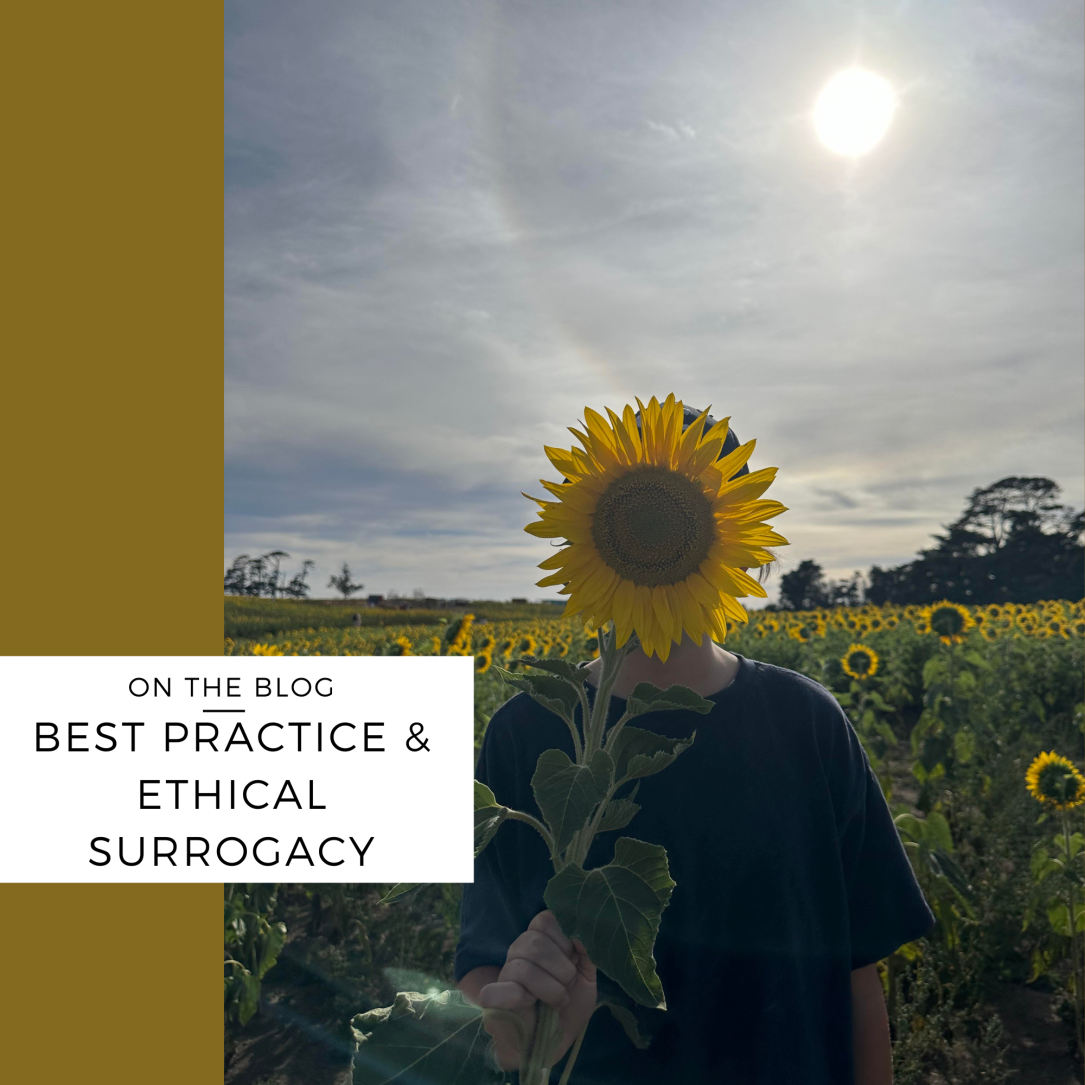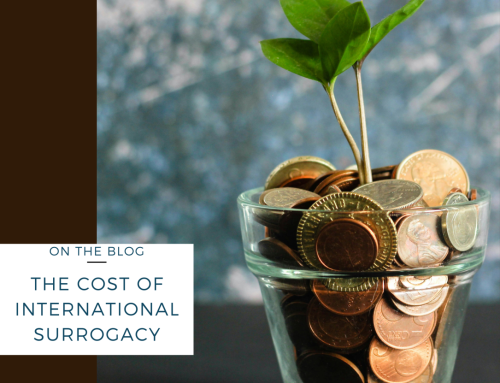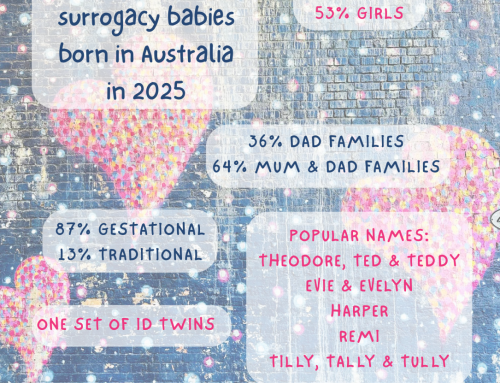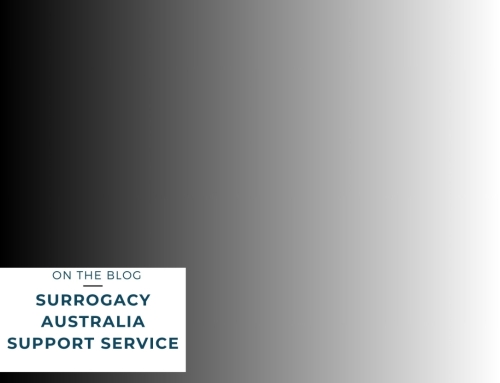Best practice and ethical surrogacy – what is it, how we do go about it, and how do we make sure we’re getting it right?
Surrogacy is often a news headline, such as in 2019 when Foreign Correspondent covered surrogacy in the Ukraine, or when allegations of human trafficking arose in Crete in 2023. Often it is not a positive story and my heart breaks for the women, babies and intended parents who have been left traumatised, mistreated and exploited.
Most parents will know the feeling of ‘baby lust’, of being willing to do anything it will take to have a baby. I am sympathetic to those feelings. But having a baby should not be at any cost, and particularly not at the costs of the interests of the child, or the welfare of the surrogate or donors. It should not be at the cost of your own mental health or well-being.
So what does best practice, ethical surrogacy and donor-conception look like? How do we ensure that we’re being ethical when we engage in surrogacy internationally? And how do we ensure we are engaging in ethical surrogacy when the service providers around us might not be delivering on their promises?
There are some agreed standards, globally, for what amounts to best practice, ethical surrogacy. These standards have been expressed in international documents such as the Verona Principles, through guidelines developed in the industry such as the American Society for Ethics in Egg Donation and Surrogacy, and through court judgements including the UK case of Re Z (Foreign Surrogacy).
What is ethical surrogacy?
Not all surrogacy is equal, and whether an arrangement is ethical has very little to do with whether the arrangement is commercial or altruistic. Generally, it is widely accepted that aspects of a surrogacy arrangement can be considered more ethical when there is a focus on:
- The rights, best interests and welfare of the child. Every child has a right to identity, birth registration, citizenship, family, access to healthcare, non-discrimination and privacy, to name a few. Some international surrogacy arrangements compromise these rights. You might like to look at the Convention on the Rights of the Child to consider these rights further.
. - The rights, human dignity, autonomy and legal protections for the surrogate, including ensuring that she has capacity for informed consent. Sadly, there are many instances where a surrogate’s rights are compromised by the industry that commodifies her for profit. A surrogate should be compensated for her time, effort and risk when she enters a surrogacy arrangement.
. - The legal framework that supports surrogacy. Safeguards such as screening for all parties, independent legal advice, counselling, education and information result in better outcomes for everyone, including the child. A legal framework, or lack of framework that does not support surrogacy, nor allows for a transfer of parentage to the intended parents, is risky for everyone involved.
For intended parents exploring their options for international surrogacy, below are some things to consider when determining if the surrogacy arrangement is ethical:
- Whether the legal framework supports the surrogacy arrangement in the country where the embryo transfer will occur, where the surrogate lives and where she expects to deliver the child. Many countries criminalise surrogacy, and unfortunately that results in some agencies moving surrogates between countries for the pregnancy and birth, which is risky for her and the baby and can result in allegations of human trafficking.
. - Will the intended parents be recognised as the child’s parents in the country of birth, and what is the process to transfer parentage from the surrogate to the intended parents? Several countries do not have adequate mechanisms to transfer parentage, which leaves the surrogate, child and the parents in legal limbo.
. - Whether the surrogate can communicate in her chosen language, is able to access counselling and legal advice in that language, and whether all documents she is signing are written in that language. Surrogates cannot provide informed consent if they do not understand the documents presented to them. Intended parents should be sure that they can communicate directly with their surrogate to safeguard themselves and her interests.
. - Will the intended parents meet their surrogate before proceeding? Will they have open communication with her, or is there an intermediary controlling that communication between the parties? Such control can be hiding more sinister arrangements and exploitation.
. - What relationship and contact will the intended parents, surrogate and child have after the birth? It is generally considered to be in a child’s best interests that they know and have information about their genetic and birth heritage. Arrangements that do not promote these relationships may not be in the child’s best interests.
. - What does the post-surrogacy, exit process look like? Have the intended parents accessed independent legal advice and migration advice to establish citizenship, passports, migration and travel? Finding out these things before proceeding, and not after the birth, is imperative.
Unfortunately there is no international regulation of surrogacy agencies, intermediaries and fertility clinics. It is very easy to publish a glossy website, promising beautiful babies for international intended parents. I suggest speaking with other intended parents and seeking their feedback about agencies, clinics and pathways, and making sure they are not receiving a commission for referring you to their own service provider.
Consider conflicts of interest, which are rife in the surrogacy industry. Not everyone offering you a service is looking out for your interests. Many people make a lot of money in the surrogacy industry and sometimes it is at the cost of ethics, your interests and the safety of your surrogate and your new baby.
Services that sponsor events and trade shows should ensure they are putting surrogacy and ethics at the forefront of their decisions.
The Australian government announced a review of Australia’s surrogacy laws which will happen in 2025-2026. The Australian government has published a website about surrogacy that you might find useful.
Intended parent (now parent) through surrogacy Costa, spoke to me about his surrogacy experience and how he managed to maintain his integrity and uphold his values, for the benefit of his daughter.
Read about international surrogacy options for Australian intended parents, and beware those who take kickbacks for facilitating overseas surrogacy deals.
Sarah has written a book, More Than Just a Baby: A Guide to Surrogacy for Intended Parents and Surrogates, which is the only guide to surrogacy in Australia.
You can find more information in the free Surrogacy Handbook, reading articles in the Blog, by listening to more episodes of the Surrogacy Podcast. You can also book in for a consult with me below, and check out the legal services I provide.








